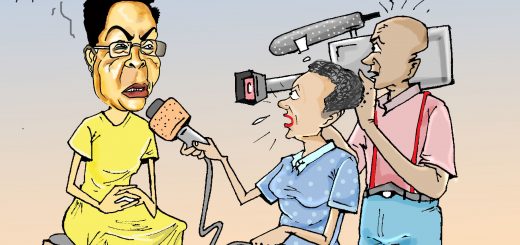The life style Audits proposed by the Inspectorate of Government are doomed without the registration of assets.

Once upon a time, the Government proposed that all property related transactions in Uganda be effected through a bank account. Obviously this requirement was meant to reduce cash transactions and trim the cash economy. As we argued earlier, corruption is not going anywhere unless we eradicate the cash economy.
The proposal was killed by those that benefit from the current state of affairs. In the Uganda of today, purchase of unregistered assets is the mode of choice of laundering illicitly acquired wealth. I can embezzle my billions today and buy my large estate of land or build myself a big rental complex without leaving a paper trail of how I used to embezzled funds, the very next day. Even if I am investigated and convicted, goodluck in tracing my assets. Obviously, I converted the embezzled funds in cash and acquired property using the cash and the property is not registered or known to government agencies. In such circumstances, how will the investigators trace my assets and carry out asset recovery.
However, if I could not legally purchase any property or build any property without using a bank or similar institution to transact, it would be exceedingly hard for me to launder the proceeds of my embezzlement. To achieve this position, our proposals are as follows:
- Every person desiring to buy property including land, stocks, machinery and cars must transact through a bank account registered in his or her name. This requirement will ensure that all property is acquired through a traceable method rather than cash. If you embezzle funds and purchase property we shall be able to Trace the proceeds of your embezzlement.
- Every transaction involving acquisition or building of property must be registered with the Inspectorate of Government and any property not declared within ninety days of acquisition or building shall be presumed to be illicitly acquired and be forfeited to the State. This provision would ensure that all property owners declare transactions with their property and make it easier for the state to trace illicitly acquired property.
- Every person who sales or acquires or develops property without using a bank account to transact and without registering the acquisition or development to the Inspectorate of Government commits a criminal offense and shall be liable on conviction to a fine equaling the value of the property or the development and imprisonment of not less than twenty years except that the Inspectorate may decide to enforce only the fine by deferring criminal prosecution by instead using the administrative procedures tribunal. This provision will deter failures to register transactions and ensure compliance with the duty to register transactions
Cost Effective means of registering transactions
Distractors will argue that it is expensive to maintain a database of the transactions registered by the persons impacted by the registration requirements above. Whereas it is true that certain infrastructure and expenditure is required it is not necessarily costly. There are open source database software including one developed by the Food and Agriculture Organization that can be utilized to register the transactions. Furthermore, there are many open source database softwares that can be utilized to register and analyse the data. For example, this data can be collected using a combination of a 100 dollar website, Microsoft Access software and Microsoft Forms. Obviously a more complex database would require considerable expenditure but it is possible to have the required database cheaply as resources are being sourced. In any case, the money that would be saved or recovered as a result of the requirement would significantly exceed the required investment.
The problem is that there is no political will either in the inspectorate of government or in the executive to push for such a requirement. The requirement needs legislative action though some elements of it could be accomplished using the current legal mandate of the Inspectorate of government.
Read More
- Four years of IGG Beti Kamya drowned the Inspectorate of Government (IG) deeper into oblivion and irrelevancy but it Can be redeemedDear Madam IGG Betty Kamya. I was skeptical when you were appointed as the Inspector General of Government because you lacked relevant experience and I was concerned that you don’t stand for anything. Years...
- The Proposal to Make Magistrates Grade Ones Chief Magistrates is an efficient use of resources that will improve service delivery in UgandaRecently the Ministry of Public Service produced an approved structure of the Lower bench of the Judiciary that didn’t include Grade One Magistrates. This sparked speculation that the government intends to either abolish the...
- If Magistrates Courts in Uganda are less competent and more prone to corruption does it mean that the poor deserve inferior justice to the rich.The prestige, reputation and value attached to anything can be deduced from the way it’s treated. We look at the actions and words of the relevant people to determine how much they value something....
- Women Members of Parliament (MPs) in Uganda are the most egregious discrimination against men in UgandaWomen Members of Parliament in Uganda are the most egregious discrimination against men in Uganda. It’s vital that all groups are represented in decision making and the legislature is meant to express the will...
- The UPDF Amendment Bill 2025. A proposed compromise that could protect political opponents of the ruling party.It’s inevitable that the The UPDF Amendment Bill 2025 will be passed into law what remains to be seen is how bad the civilians will be screwed. The rumormill has it that Parliament has...


